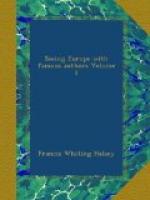In the center of the floor an octagon space is marked out with a rim of stone, and within this space stands a massy old dog, or brand-iron, about a yard and a half wide, and the two upright ends three feet six inches high, having on their outer sides, near the top, the double broad arrow of the Sidney arms. The smoke from the fire, which was laid on this jolly dog, ascended and passed out through the center of the roof, which is high, and of framed oak, and was adorned at the spring of the huge groined spars with grotesque projecting carved figures, or corbels, which are now taken down, being considered in danger of falling, and are laid in the music gallery.
IV
ENGLISH LITERARY SHRINES
Stratford-on-Avon [Footnote: From
“The Sketch Book.” Published by G.P.
Putnam’s Sons.]
BY WASHINGTON IRVING
Thou soft flowing Avon, by thy silver stream
Of things more than mortal sweet Shakespeare would
dream;
The fairies by moonlight dance round his green bed,
For hallowed the turf is which pillowed his head.
Garrick.
I had come to Stratford on a poetical pilgrimage. My first visit was to the house where Shakespeare was born, and where, according to tradition, he was brought up to his father’s craft of wool-combing. It is a small, mean-looking edifice of wood and plaster, a true nestling-place of genius, which seems to delight in hatching its offspring in by-corners. The walls of its squalid chambers are covered with names and inscriptions in every language, by pilgrims of all nations, ranks, and conditions, from the prince to the peasant; and present a striking instance of the spontaneous and universal homage of mankind to the great poet of nature.
The house is shown by a garrulous old lady, in a frosty red face, lighted up by a cold blue anxious eye, and garnished with artificial locks of flaxen hair, curling from under an exceedingly dirty cap. She was peculiarly assiduous in exhibiting the relics with which this, like all other celebrated shrines, abounds. There was the shattered stock of the very matchlock with which Shakespeare shot the deer, on his poaching exploits. There, too, was his tobacco-box; which proves that he was a rival smoker of Sir Walter Raleigh; the sword also with which he played Hamlet; and the identical lantern with which Friar Laurence discovered Romeo and Juliet at the tomb! There was an ample supply also of Shakespeare’s mulberry-tree, which seems to have as extraordinary powers of self-multiplication as the wood of the true cross; of which there is enough extant to build a ship of the line.




